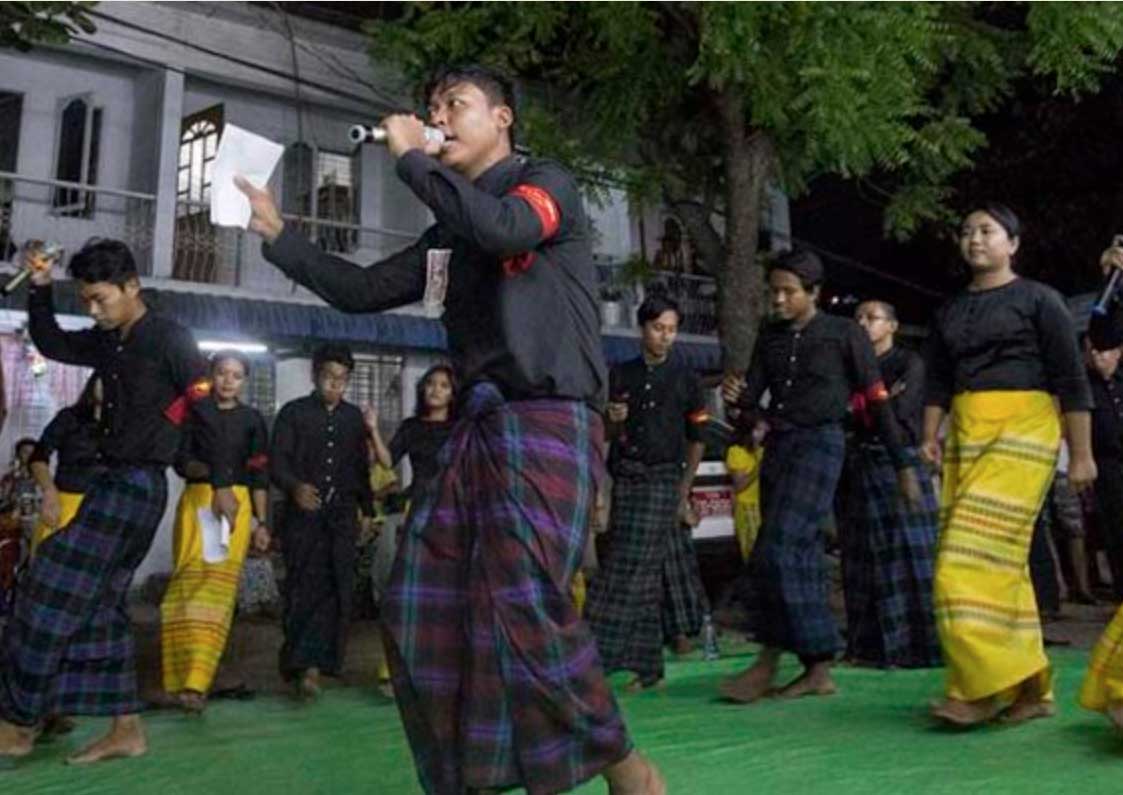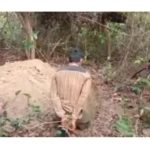In Myanmar, Courts Increasingly Used to Silence Criticism of Military and Govt
By SAN YAMIN AUNG 1 November 2019
YANGON—Activists, human rights defenders, journalists and ordinary citizens face a growing threat of imprisonment for voicing opinions critical of the Myanmar army and government.
Laws that criminalize various types of expression have been used to put several critics of the government and military—especially those who challenge the military-drafted 2008 Constitution and the military’s role in politics—behind bars in recent months.
In the most recent case, five members of the Peacock Generation Thangyat troupe sued by the military were sentenced to one year in prison with labor on Wednesday over satirical performances they staged criticizing the political role granted to the military by the undemocratic 2008 charter, leading to their arrests in April. Thangyat is a popular traditional Myanmar performance art that often involves political satire.
The troupe’s members face additional charges filed by the military in a number of different townships outside of Yangon where they staged performances.
By SAN YAMIN AUNG 1 November 2019
YANGON—Activists, human rights defenders, journalists and ordinary citizens face a growing threat of imprisonment for voicing opinions critical of the Myanmar army and government.
Laws that criminalize various types of expression have been used to put several critics of the government and military—especially those who challenge the military-drafted 2008 Constitution and the military’s role in politics—behind bars in recent months.
In the most recent case, five members of the Peacock Generation Thangyat troupe sued by the military were sentenced to one year in prison with labor on Wednesday over satirical performances they staged criticizing the political role granted to the military by the undemocratic 2008 charter, leading to their arrests in April. Thangyat is a popular traditional Myanmar performance art that often involves political satire.
The troupe’s members face additional charges filed by the military in a number of different townships outside of Yangon where they staged performances.

The military plaintiff in the case, Lieutenant Colonel Than Htun Myint, told the media on Wednesday that people should not be allowed to hide behind the banner of “human rights” while criticizing members of the military, who he said are fighting on the front lines and sacrificing their lives for the country.
”We applied directly to the court in this case, as we wanted justice. We accept the legal judgment,” he added.
Since April, at least a dozen people have been targeted by lawsuits filed by the military; some have already been sentenced to prison.
Among them are prominent filmmaker and human rights activist Min Htin Ko Ko Gyi and ex-army Captain U Nay Myo Zin. Both were sentenced to one year’s imprisonment under Article 505(a) of the Penal Code—the same charge used to jail the Peacock Thangyat troupe— for criticizing the undemocratic Constitution, the military leadership and its involvement in politics.
The non-bailable offense carries a penalty of up to two years’ imprisonment for anyone convicted of making, publishing or circulating statements, rumors or reports intended to cause military officers to mutiny, or to fail in or disregard their duties.
Other targets include two local monks in Mandalay, a writer who gave a speech at a public rally in Tanintharyi Region in support of constitutional amendment, a farmer from Tanintharyi Region who questioned land confiscation by the military and the editor of The Irrawaddy’s Burmese-language edition.
On Thursday, a court in Kawthaung Township of Tanintharyi Region also accepted cases filed by the military against U Nay Myo Zin, lawyer U Kyee Myint and poet Saw Wai under Article 505(a). The trio were sued over speeches they made in April at a public rally in the township criticizing the Constitution.

Maung Saungkha of the freedom of expression advocacy group Athan said the group had seen a surge in the number of lawsuits brought by the military against critics since April.
He believed the increasing number of lawsuits stemmed from political pressure arising from the ruling National League for Democracy (NLD)’s attempts to amend the Constitution in Parliament.
Speaking to The Irrawaddy in July, military spokesperson Brigadier-General Zaw Min Tun denied the increase in the number of cases was politically motivated. Rather, he said it simply reflected an increase in the number of people defaming the military.
“We wouldn’t have a reason to sue if they weren’t insulting the military. As an institution, the military has a right to defend its dignity. If someone harms it, we need to take action against them,” he said.
Maung Saungkha added that while the military has long been known as intolerant of criticism, the democratic government is not far behind it in terms of willingness to sue critics.
He said lawmakers and government officials are also using defamation and other laws that criminalize expression to stifle criticism of the state, state leaders or individuals.

According to a report by Athan, between late 2013 and June 2019 officials filed 27 defamation cases against perceived critics under the Telecommunications Law, while the military filed 16.
Maung Saungkha said government officials have also filed defamation and incitement charges under the Law Protecting the Privacy and Security of Citizens, and Articles 500, 505 and 124(a) of the Penal Code.
In June this year, six Karenni youths who were in a dispute with the Kayah State government regarding the installation of a controversial statue of General Aung San in Loikaw were arrested after being sued by the state government under the Law Protecting the Privacy and Security of Citizens. They are currently on trial.
“It has become a very dangerous situation for all activists, politicians and human rights defenders. We face arrest at any time for our stands and our comments,” Maung Saungkha said.
Ko Bo Kyi, secretary of the Assistance Association for Political Prisoners (AAPP), said the recent series of arrests is having a chilling effect on would-be critics of the government and military.
“They are spreading fear with the intention of silencing their critics,” a former political prisoner said.
If it truly respects democracy and human rights, the government should use its majority in Parliament to review, amend or repeal those laws and legal provisions that criminalize criticism of the authorities, he added.



